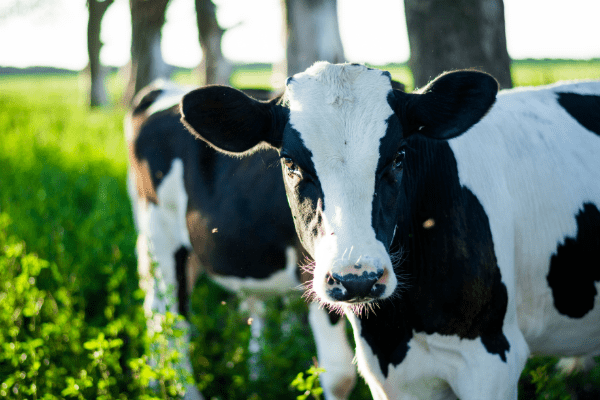When looking for ways to reduce environmental impact, an increasingly popular strategy is to eat less meat, dairy and other animal products. Considering the magnanimous carbon footprint of factory farming, the countless ecological problems caused by CAFOs, and the fact that that raising an animal requires more energy than growing vegetables, this strategy certainly has merit.
However, not all meat and dairy production is equally destructive. As a mighty contingent of small-scale, organic and regenerative farmers and ranchers demonstrate daily, animal-derived foods and beverages can be produced much more sustainably than conventional products. In fact, depending on the specific livestock-raising and agricultural practices employed, their production may even help to revitalize the environment.
A newish style of dairy farming fits this bill precisely. Managed grazing, a mainstay in big dairy-producing nations like New Zealand and Ireland, is gaining more traction in the U.S. It’s a much more sustainable alternative to conventional dairy—both ecologically and economically speaking.
In a nutshell, managed grazing involves planting the majority of acreage with perennial forages and carefully controlling livestock density and grazing activity to match the land. Cows are rotated through paddocks at various growth stages to ensure they consume optimally nutritious grasses and produce top-quality milk. Meanwhile, their hooves churn up the earth, their ruminant stomachs produce nutrition, their manure enriches the soil and the fields flourish, with some native plant species even reemerging over time.
This system requires no tilling, no fertilizing, no manure spreading and significantly fewer inputs overall than conventional dairy farming. Healthier, more resilient soil also means less runoff and erosion. And because managed grazing operations must be on the smaller side, they can be integrated into more and more sensitive areas.
Tera’s latest Edible-Alpha® podcast guest, longtime Wisconsin dairy farmer Joe Tomandl, recognized the immense potential of managed grazing many years ago. But beyond the system’s environmental benefits, he also realized it could inject new life into the state’s dairy industry, which has lost 44% of its dairy farms over the last decade. In doing so, managed grazing could help revive rural economies.
This led to the creation of the Dairy Grazing Apprenticeship, which connects aspiring dairy farmers with existing managed grazing operations for on-the-job training. After proving successful in Wisconsin, the program has since expanded to 15 states and now includes 200 training farms. Be sure to tune into the new podcast for the whole scoop!
But for managed grazing to continue scaling and reach its full environmental and economic potential, there has to be market demand for dairy products produced in this fashion. Same story for 100% grass-fed beef, organic eggs, regenerative goat cheese and any other type of animal-based food produced sustainably. This will require continual consumer education about how and why these products can be part of an environmentally conscious diet and part of the climate change solution.
Listen to the podcast here!

And now, our roundup of the best food and beverage finance news, events and resources from around the web…

Business Model Insights
- The future of food retail, from AI to consumer-first technology (New Hope Network) Accelerated by the pandemic, qualities once seen as aspirational—sustainability, transparency, affordability, etc.—have become table stakes for food brands and retailers.
- The importance of reaching moms during the pandemic (Produce Blue Book)
- The Future of Sustainable Packaging for Cold Foods (Refrigerated & Frozen Foods)

Raising Capital
- Survive to thrive (The Intertwine Group) Early-stage brands are often too focused on growth and not focused enough on first gaining traction and proving their path toward profitability. The best way to survive for a chance to thrive? Be laser-focused on cash and capital efficiency.
- Pandemic slows investment dealmaking, but also opens opportunities (FoodNavigator-USA)
- 15 Ways to Find and Attract Investors Remotely (Forbes)
CPG/National Brands
- The holiday CPG challenge: Convince consumers not to trade down (Food Dive) During the holidays, consumers typically trade up for premium brands to impress houseguests and guarantee flavorful dishes. This year, however, IRI predicts good value will be the top purchasing driver. Here’s how brands can compete with cheaper competitors and private labels.
- CPGs still struggle to measure environmental progress, but there’s a solution (Food Dive)
- The digital shelf: CPG food startups in the era of online grocery (AgFunder News)

Market Trends
- Flavor trends for 2021: fresh from the garden, breakfast all day, chicken & home baked goods (FoodNavigator-USA) Consumers’ recent leanings toward comforting, nostalgic and indulgent foods and beverages are about clash head-on with more practical, healthier preferences inspired by the new year.
- Study: Do consumers see ‘pretty’ food as healthier? (FoodNavigator-USA)
- Covid Lockdown Shopping Habits Are Hard to Break (Bloomberg)

Farming and AgTech
- Biden advisors push a new plan to slow global warming: A soil carbon bank for farmers (The Counter) A policy memo by a Biden-linked group offers clues about how the new administration may address climate change through reimagined farming practices—even without Congressional approval.
- ‘Justice’ bill would transfer up to 32 million acres to Black farmers (Fern’s Ag Insider)
- New research warns of food system impact on climate (Food & Beverage Insider)

Deals/M&A
- $8.37B invested in food tech in first 3 quarters outpaces all of 2019, report says (Food Dive) Investor interest in food has been growing as more and more realize it’s a safe space with real potential to see returns on their money. This trend has only accelerated in light of the pandemic.
- Mars buys Kind North America (Food Dive)
- Farmstead Raises $7.9M to Support Nationwide Growth (Winsight Grocery Business)

Virtual events
- Rodale Institute Panel: Climate Change and the Soil Carbon Solution: 12/5
- Edible-Alpha® Consultant Huddle: 12/7 at 1 p.m. CST
- BevNET Live Winter 2020: 12/7–12/9
- Edible-Alpha® Live! Kickoff Event: 12/8 at 6 p.m. CST
- Edible-Alpha® Live!: 12/9 at 9 a.m. CST
- NOSH LIVE: 12/14–12/16
- FFI Scaler Series: Sales & Distribution Planning Workshop: 1/14
- International Production & Processing Expo: 1/25–1/29
- PLMA Live! Presents Private Label Week: 2/1–2/5
- FFI Scaler Series: Marketing & Branding Planning Workshop: 2/4
- AFFI-CON 2021: Accelerating Growth with Frozen Ingredients: 2/17–2/26
- FFI Scaler Series: Operations & Organization Planning Workshop: 2/24

